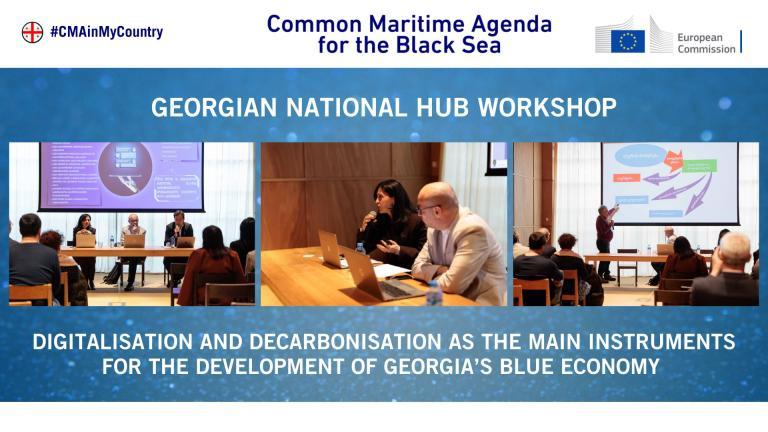On 21 February 2025, the Georgian National Hub hosted an event titled “Digitalisation and Decarbonisation as the Main Instruments for the Development of Georgia’s blue Economy”. This event was organised within the framework of the #CMAinmycountry and formed part of the 2025 Tourism Institute Festival in Batumi, Georgia. The workshop attracted a diverse audience, including representatives from academia, national authorities, private companies, and NGOs, both in person and online, ensuring active engagement and expertise from Georgia’s maritime sector.
The Georgian event was centred on two major pillars: digitalisation and decarbonisation, both crucial for enhancing efficiency, sustainability, and economic development in the blue economy. Key discussions covered the digital transformation of Georgian ports, the development of blue skills, decarbonisation initiatives such as cold ironing and electric ferries, aquaculture policies, maritime tourism innovations, and funding opportunities.
Key discussion takeaways:
A major focus was on port digitalisation, with Georgia making significant strides in modernising its maritime infrastructure. The Maritime Single Window and Port Community System were highlighted as crucial tools for enhancing efficiency and transparency. Experts reinforced that digital transformation will not only streamline operations but also drive economic development. Sustainability was a key theme, with discussions centring on decarbonisation initiatives. The introduction of electric ferries and cold ironing were showcased as practical steps toward reducing emissions. However, stakeholders stressed the urgent need for a comprehensive policy framework to accelerate the transition to greener maritime technologies. The event also explored aquaculture as a vital sector for Georgia’s economic diversification. Experts shared insights on sustainable fisheries policies and the legislative frameworks required to align with international environmental standards.
By supporting responsible aquaculture practices, Georgia can strengthen its marine biodiversity while boosting local economies. Maritime tourism received renewed attention, with a strong focus on sustainable blue tourism innovations, which aligns with the recently launched CMA Sustainable Tourism Technical Group. The preservation of underwater cultural heritage was identified as a unique opportunity to enhance Georgia’s tourism industry. Presenters introduced innovative business models aimed at attracting investment and developing eco-friendly tourism ventures along Georgia’s coastline. A dedicated session on Horizon Europe funding introduced participants to financial opportunities supporting maritime digitalisation, sustainability, and environmental protection. Attendees gained practical insights into securing EU grants, encouraging greater investment in research and innovation. One of the event’s biggest successes was its ability to foster collaboration across multiple sectors. Key players from government bodies, the private sector, academia, and NGOs engaged in productive discussions, paving the way for future joint initiatives. The event, hosted as part of the Tourism Institute’s “Tourister” festival, further increased engagement and visibility, highlighting the importance of a united approach to maritime development.
This event underscored Georgia’s commitment to a modern, sustainable, and collaborative maritime sector. By leveraging digital innovation, sustainability, and cross-sector partnerships, Georgia is positioning itself as a regional leader in the blue economy. With ongoing efforts in place, the country is set to enhance its maritime capabilities while ensuring a greener, more resilient future.

